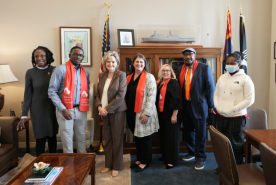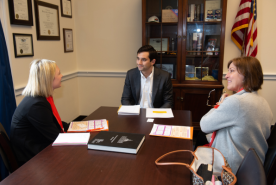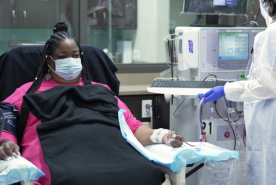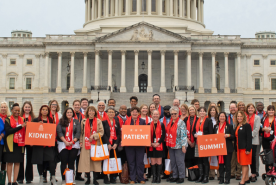January 21, 2024
By Sharon Pearce, Senior Vice-President of Government Relations
2024 promises to be a busy year for the NKF Government Relations Team. With Congress still fighting legislative battles that carried over from last year and a Presidential Election looming on the horizon, it will be tough to get much done. That said, we do have some big items on our “to-do” list. Below are the highlights, but knowing how quickly things change in Washington and around the states, don’t be surprised if a few items are added or fall off over the year.
Legislative Priorities
Loyal listeners will recognize many of our legislative priorities for 2024. After all, they’re pretty much the same as the ones we had in 2023: the Living Donor Protection Act, Improving Access to Home Dialysis Act, and the Organ Transplant Transparency, Accountability and Reform Act. Why is that, you say? Well, enacting legislation is difficult, especially in our extremely partisan and dysfunctional US Congress. But we’re going to continue to push as hard as we can to enact federal protections for living donors, ensure that all patients have the support they need to succeed on home dialysis and ensure that underserved and marginalized communities can access a transplant.
NKF will also once again be pushing to ensure federal research and prevention activities are appropriately funded. The National Institutes of Diabetes, Digestive and Kidney Disease supports important basic, translational, clinical, and implementation research that helps us better understand the genetics, physiology, diagnosis, management, and treatment of kidney diseases. This important research is vitally important to the development of new therapies and potential cures for kidney diseases. Similarly, the Centers for Disease Control and Prevention funds a number of public health initiatives aimed at preventing and managing CKD at the population level. Thanks to the hard work of NKF advocates, kidney research and prevention activities have seen bigger increases in recent years. We hope to maintain that trend.
We’re also adding another appropriations priority this year, which is to increase funding for the Transplant Modernization Effort at the Health Resources and Services Administration.
Learn more about NKF’s legislative agenda.
In the States
States are our laboratories for change and where we have the best chance for advancing legislation. LDPA continues to top our to-do list in the 18 states that don’t yet have one. In other states, we’re focusing on other initiatives to expand access to living donation, including tax credits and paid leave policies. We’re also working with coalition partners on efforts to expand younger ESRD patients’ access to Medigap, are supporting efforts to pass “lights-and-sirens” legislation that literally removes traffic barriers for donor kidneys, and are working to create kidney taskforces. Want to learn more about what’s going on in your state? Reach out to nkfadvocacy@kidney.org.
Want to see how your state supports kidney health? View our state impact map.
Policy Priorities
Our policy agenda encompasses all the federal rules, regulations, payment policies, and other initiatives that affect kidney patients. It’s a pretty big job, so we divide it up by topic: CKD policy, ESRD policy, and Transplant Policy. Even then, there’s a LOT we’ll be working on.
To summarize:
- CKD: The key to CKD management is early diagnosis and management. We’ll be pushing the US Preventive Services Task Force to issue a CKD screening recommendation, we’ll be working to ensure that payment models incentivize CKD screening and care, and we’ll be pushing for earlier access to tools like kidney disease education and medical nutrition therapy.
- Kidney Failure (or ESRD): Currently, 85 percent of people with kidney failure access dialysis care in an in-center unit, even though many people would prefer to dialyze at home. NKF is working to ensure that the rules surrounding dialysis, payment policy, and quality measures are all structured to support patient choice, optimal dialysis starts, and a high-quality ESRD treatment that is aligned with the patient’s preferences and values. Visit our regulatory advocacy page to learn more.
- Transplant: Every day, 14 people die waiting for a kidney transplant. And that doesn’t include all of the patients who can’t even make it to the waitlist because of inefficiencies, inequities, and barriers to care. NKF is fighting across the board to improve the transplant system to make it more efficient, transparent, accountable, and patient-centric. Specifically, we’ll be advocating this year to:
- Remove race as a variable from the KDRI equation.
- Ensure transplant centers restore time on the waitlist to patients adversely affected by the previous eGFR measure.
- Improve collection and reporting of pre-transplant data and reporting to ensure equity in access to referral and transplant.
- Improve transplant center practices and reporting to incentivize shared decision-making and transparency on organ-offer/acceptance.
It’s important to note that these are only the “highlights” of our agenda – there are still a lot of things we’re going to push to change. And it’s possible there will be even more issues that will pop up over the course of the year. That’s why you need to stay tuned to this station and make sure you’re up to date.
Want to learn more about how you can get involved in NKF’s advocacy work? Visit our Voices for Kidney Health Website or Ask Sharon Pearce at nkf.govrelations@kidney.org.









